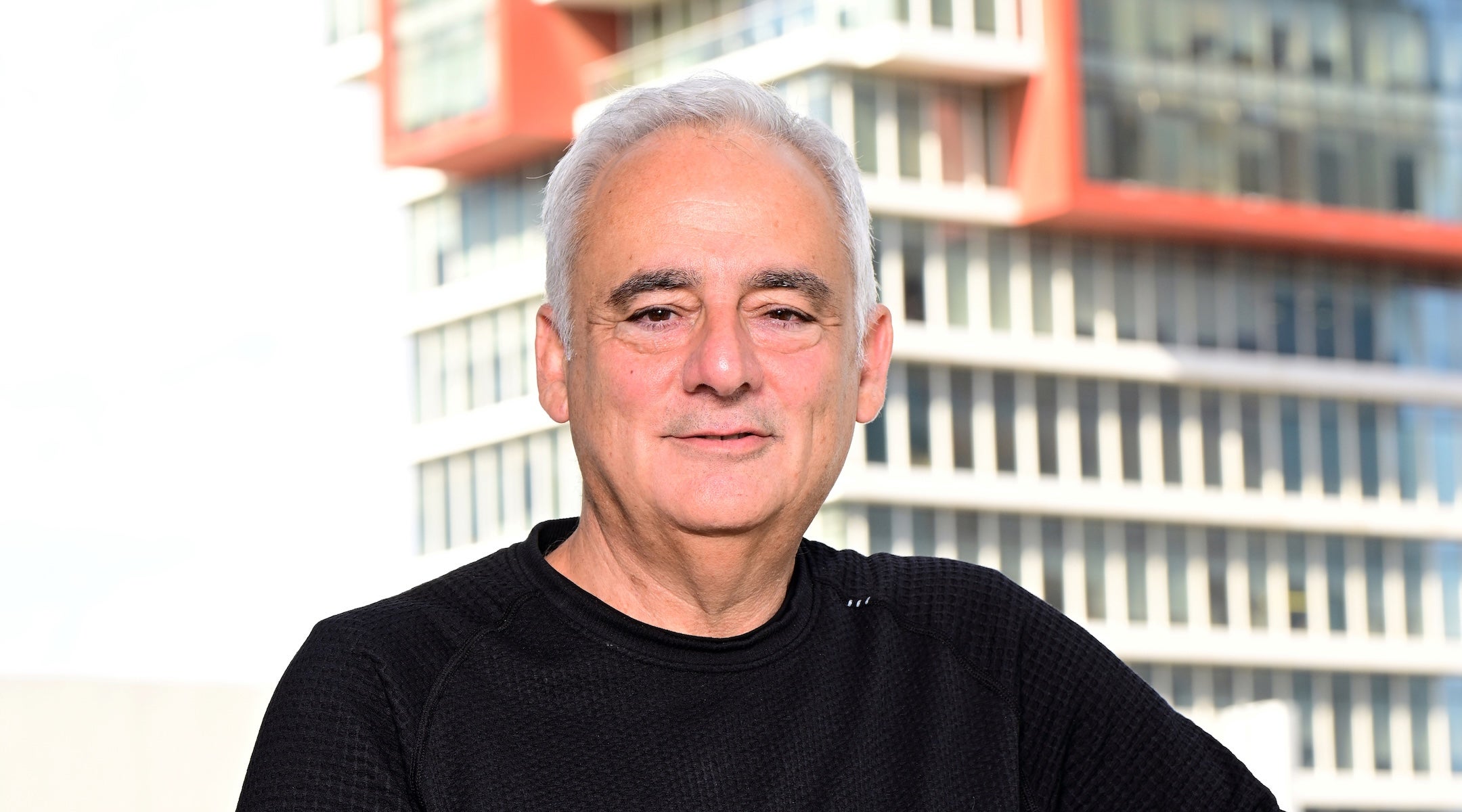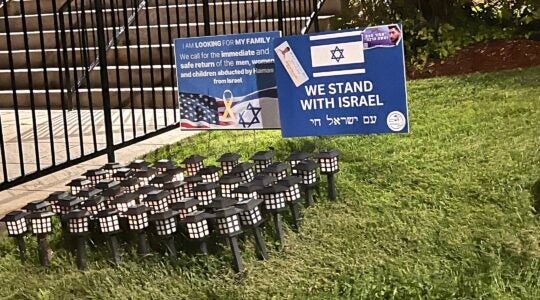The revelation that President Donald Trump intends to accept a $400 million airplane from the government of Qatar to replace Air Force One has dominated news headlines and generated widespread outcry.
Scores of journalists and critics are pointing to a pattern of alleged Qatari influence-buying in the United States. But these allegations are not new. One of the earliest and most prominent voices to raise alarm about Qatari donations in the United States is Canadian-born scholar Charles Asher Small.
He is the founder and executive director of the Institute for the Study of Global Antisemitism and Policy, an American organization that works with academics around the world.
Since as early as 2012, Small and ISGAP have been exposing and trying to draw public attention to the flow of undisclosed donations from Qatar to American higher educational institutions. Small argues that this money is at the root of the reported increase in campus antisemitism.
In 2019, during Trump’s first term, ISGAP’s findings prompted the Department of Education to open an investigation into several major universities, which ultimately uncovered significant failures to report foreign funding.
Qatar has also been condemned by pro-Israel advocates for the country’s role in funding Hamas, especially after the massacre and kidnapping of Israelis on Oct. 7, 2023. Several staunch Jewish supporters of Trump offered rare criticism of the president over the Qatari airplane gift proposal.
“Taking sacks of goodies from people who support Hamas, Muslim Brotherhood, Al Jazeera, all the rest, that’s not America First,” right-wing pundit Ben Shapiro said on his podcast. “I think if we switched the names to Hunter Biden and Joe Biden, we’d all be freaking out on the right.”
With Qatar in the news, the Jewish Telegraphic Agency called Small to discuss his view of the airplane gift and the pressure the federal government is putting on universities in the name of combating antisemitism.
This interview has been edited for length and clarity.
JTA: You just landed in Washington, D.C. Are you in town to do anything you can talk to me about?
Charles Small: Yeah, definitely. We’re having an ISGAP event, trying to develop policies to ban the Muslim Brotherhood in the United States.
Who will be there?
A lot of congressional staffers will be there. The co-chairs of the House task force on antisemitism will be there, and an official with the [Department of Education’s] Office for Civil Rights will be there. We’re wanting to start a conversation among policymakers that this is an issue that can’t stand anymore.
You know — there were attempts to ban the Muslim Brotherhood in the past.
Why did they fail, and why would this time be any different?
I believe there were nine attempts over the years. And it kind of boiled down to issues of the First Amendment, freedom of expression, free speech, and political rights that are enshrined in the Constitution. But we feel that the situation has now shifted from an issue of freedom of speech to an issue where there’s violence on our streets, there’s violence in our institutions, there’s criminal activity, there’s damage to property, and that this has to be dealt with in an appropriate manner, consistent with our constitution and safeguarding our citizens.
The reason I called you is that you and your organization are the leading voice raising alarm about the Muslim Brotherhood and Qatari influence-buying in the United States. So what do you say about the Qataris buying an airplane for Trump?
I don’t know what they are doing. I don’t know what the rationale is. I don’t know if they’re feeling a little bit of pressure, especially after October 7th, a bit in the spotlight. Are they overstepping and just trying to just influence and buy as many people as they can?
This is really outrageous and extraordinary and very symbolic of a problem that the president of the United States would be flying around on this gift from a regime that has a spiritual oath to the Muslim Brotherhood.
I’m not hearing criticism of Trump in what you’re saying. He’s not a passive actor here.
If you ask me a question, maybe more pointedly…
Sure. You’ve been telling the whole world the Qataris are buying influence with their money, and now the president is accepting a gift from Qatar. Is that a failing on his part?
I think it’s extraordinary that they’re buying a gift for the president of the United States. It’s very problematic that Qatar is able to buy influence now in the White House, in the Senate, in Congress, in our most sacred institutions.
The most sensitive institution is higher education. This is where young Americans learn to be citizens. Liberal education is about searching for truth and defending democratic principles, notions like, We’re all equal under one legal system, which is not consistent with replacing democracy with the caliphate.
I would like to discuss your beliefs about higher education, but let me first try to ask the question again: Is Trump allowing himself to be bought?
I think for the president of the United States to take this gift from the Muslim Brotherhood-inspired regime is really an insult to democracy. But it’s not just the president. This has been going on for many, many years. We estimate $100 billion has gone into higher education from the Qataris as well as into law firms, PR firms, real estate companies, investment companies. The United States really needs to do some soul-searching, and you know, at least consider the implications of taking money from regimes that want to murder Jews and destroy democracy.
Your argument seems to raise a larger question. I mean, there’s foreign influence and then there’s foreign influence, right? Qatar is not Russia, China, or Iran, which are our adversaries. Qatar is officially classified as one of our closest allies and we have a massive military base there.
It’s very problematic. I think what Americans really need to understand, if I can drive home one message given … I’m trying to answer your questions very clearly and unequivocally, but I also see from your questions, if I may push back a little please — antisemitism is deeply rooted now in the United States of America. It’s in our cultural institutions. It’s in our education. It’s in K-12. People on the right of the political spectrum need to fight antisemitism and anti-democratic culture. People on the left also really need to look at the antisemitism and the anti-democratic culture on their side of the aisle. We really need to come together in the middle and defend basic, basic democratic principles.
Let me shift gears for a moment. Sometimes the characterization of the Muslim Brotherhood — the money, the secret agenda, the hidden influence on our institutions — sounds a lot like the tropes used in antisemitic conspiracy theories. Have you ever gotten that reaction? Why is this different?
It’s a false argument. Antisemitism is quite tragically unique in history and shouldn’t be conflated. That’s number one.
Number two, in our reports, we have hundreds, hundreds and hundreds of footnotes and sources. This is not a conspiracy theory. This is high-caliber research. We have analysts from various academic disciplines in various parts of the world. Muslim, Jewish, Christian. We’re progressives and conservatives. We’re experts in forensic accounting and terror financing and radical Islam and antisemitism.
We have a research center in a place called Cambridge University, where our work is held to the highest standard. We look at the ideology, the philosophical leaders of the Muslim Brotherhood, where it emerged, what their goals are. We don’t make innuendos. We don’t make assertions if they’re not backed up by fact and good sources, and usually three or four sources, because we know if we make a mistake in our writings, our entire work will collapse and it’ll be worth nothing, and we take our work very seriously.
To go back to something you said earlier: It sounds like you truly cherish America’s tradition of higher education. And so I’m wondering how you view the pressure the federal government is putting on Columbia, Harvard and other universities. There’s talk of taking away their tax-exempt status. Many universities are saying higher education is under attack by the federal government. How do you view this debate?
It’s a very important question. So on the one hand, the federal government cannot give money to educational institutions that discriminate. It’s against the law. What they’re doing now is putting universities on notice that they have to deal with their issues of discrimination. It’s absolutely correct. There is a responsibility to our citizens and to our society and to our democracy to ensure that our young people are getting a proper education and are not dealing in hatred.
On the other hand, you have a point. Do the Trump administration and certain conservative elements in this country want to use this issue to smash down liberal institutions? I have no doubt. I have no doubt that that’s simultaneously true in some places.
Charles, are you a conservative or a liberal?
So I grew up in a place called Canada, where education, healthcare, transportation, and housing were kind of understood as human rights. I went to McGill University for $200 a year. I would consider myself kind of a social democrat. I was active in the anti-apartheid movement. I’ve been very active on indigenous issues in Canada, also Ethiopian Jewry and Soviet Jewry. I was the chairperson of the African National Congress solidarity committee. I worked with the leadership of the ANC in the ‘80s and ‘90s, and I really kind of come out of that background, and it’s outrageous that some people parade themselves as being progressive when they’re calling for things that are anything but progressive or social democratic. So yes, I would consider myself on the left.
Do you think that’s how you’re perceived?
I think that people dealing with issues surrounding the Muslim Brotherhood and radical Islam are often dismissed as being kind of right-wing or other things. And to me, this is actually an expression of antisemitism when nobody takes the time to sort of ask where we’re coming from, what we’re fighting for.
You’re in Washington for meetings about how to ban the Muslim Brotherhood in the United States. How would you do it? What are some conceivable approaches? What is within the range of possibilities?
It’s a great question. We have a lot of experts on the Brotherhood from countries that ban them from the Middle East. There’ll be a few countries, the people from Jordan, from Saudi Arabia, from Egypt and other countries, and they’ve been dealing with this for a long time. It’ll be a day of brainstorming. We’re not going in there with a set agenda. It’s really a group of experts getting together to discuss it.
We believe something needs to be done with antisemitism and violence. It really feels like we’re at a tipping point. And I think different groups and ideologies are, in some cases, instigating this. We don’t want to be in a situation where we start having martyrs.
OK, but my question is, what kind of tools do you think would be used? Things like designating the Muslim Brotherhood as a terrorist organization?
One vehicle would be to, yeah, designate the Muslim Brotherhood as a terror organization. But then, you know, it’s complicated, because there’s some, there’s some groups that are affiliated ideologically and politically. So it’s really having kind of informed people discussing and debating and perhaps even arguing about perspectives of what to do.
Connect the dots for me. How does Qatari money buy influence, exactly? And how does it contribute to antisemitism?
Okay, so let’s take one example. Take Yusuf al-Qaradawi. When I was part of the anti-apartheid movement, I had this professor… he was one of the founders of the Black consciousness movement, and he said to me with this sort of a grin, ‘If you want to fight for human rights and fight racism and fight antisemitism, you have to know the mind of your enemy.’
That’s lesson number one and in this country, we don’t take the time. We don’t think we need to take the time to understand the other perspective. But the Muslim Brotherhood, they know our languages, they know our culture. They’ve mastered our system, our political system. They know us. So we don’t take the time to even know them. And we think that if we’re nice or accommodating, that everything will be OK.
Qaradawi, who was the spiritual head of the Brotherhood, always preached his entire life that the true believer is obligated to finish the work of Hitler. The Brotherhood takes the Protocols of the Elders of Zion and even Nazism and fuses it with what I would call the perversion of Islam. Antisemitism is a core element of the ideology. It’s the raison d’être of the Brotherhood, and this is why, if you take the Palestinian chapter of the Muslim Brotherhood, Hamas, and you read their covenants, they’ve basically plagiarized the protocols. This is their worldview. And the Qatari regime has a spiritual oath to this ideology.
OK, but explain how donating to a university helps them accomplish what you say they are after.
Well, they can fund Middle East Studies, which in many universities is not a friendly place to any kind of conservative, liberal, post-modern, whatever you want. The discourse coming from Middle East Studies really moves to other social sciences and the humanities.
On another level. Take, for example, we’re at Cambridge and we have a center on antisemitism and our budget is probably half a million dollars a year. We have some soft power because it’s Cambridge.
Imagine if I came in with $10 billion — I would get red carpet treatment. I could fund hospitals and cancer research andengineering, but I’m also going to be able to influence the culture of the institution.
I get it in theory, but do we have, say, a case study of how this influence played out at any particular university?
I find your questioning interesting, because I’m sort of laying out something that I would argue is rather obvious and you’re not convinced.
Well, I didn’t say I’m not convinced. I am a journalist, so I tend to focus on concrete facts.
I want to ask you a question. What would happen with a group of Nazis or white South Africans that came with $10 billion and they set up institutes of eugenics and racial theory or biology at top universities. And then they create a group called not SJP, but Whites for Justice in America, and they start setting up encampments, and they start blocking the path of African Americans and Jews and gay people, and they wear white sheets at the encampments, and…
Again, I understand the point you’re making.
It’s very clear that it will be the use of soft power in a way that would be shocking and unacceptable.
In one of our reports called the Network of Hate, we show that universities that are taking money from Qatar have 300% more instances of antisemitism on their campus compared to universities that are not taking their money. It’s a good indicator. The methodology, it’s not perfect, but it gives a good picture.
So perhaps you’ve found some correlation, but what I think you’re saying there’s an opening, an opportunity to do more work and document the thing you are certain is happening.
I think journalists, I think scholars — the role of the intellectual, the role of a good journalist is to shed light where there’s darkness. And, yeah, I think there should be investigations.
JTA has documented Jewish history in real-time for over a century. Keep our journalism strong by joining us in supporting independent, award-winning reporting.






